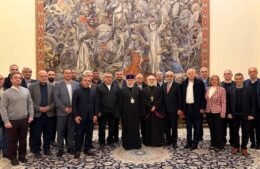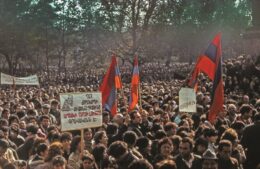REP. SCHIFF: The Plight of Syria’s Christians
- (0)
BY REPRESENTATIVE ADAM SCHIFF
As winter descends upon the Middle East, the plight of Syria’s people, who have endured nearly three years of savage civil war, grows more desperate with each passing day.
Fighting rages on throughout much of the country and, with government forces making headway in recent months, many of the rebel groups have splintered, turning on each other. As in wars throughout history, it is civilians – especially children – who have borne much of the suffering. More than nine million Syrians are in need of humanitarian assistance and a quarter of these, two point two million, have fled the country, mostly to neighboring Lebanon, Jordan and Turkey. Half of those refugees – more than one million people – are children.
Another six point five million Syrians are internally displaced, having fled their homes but remaining inside the country, often in parts of Syria that have changed hands on multiple occasions and with attendant civilian suffering.
While all of Syria’s people have been affected by the fighting, it is Christians, who make up about ten percent of the country’s population, who are at greatest risk, given their small numbers and the increasingly religious nature of a war that started out as a broad-based secular movement that sought to change the character of the Syrian regime – but not the regime itself.
For two millennia, Syria has been home to one of the oldest Christian communities in the world, a population dominated by the Eastern churches, but also including smaller numbers of Catholics and Protestants. Syria’s Christians have been comfortably and fully integrated into the economic, political and cultural life of modern Syria and, despite their small numbers, are well-represented among the country’s elite. Tragically, this long, peaceful coexistence has been shattered and half a million Syrian Christians – nearly one in four – have fled the country since the fighting began.
Like minorities the world over, Syria’s Christians have tried to avoid getting dragged into the fighting that has gripped their homeland. But with their top two population centers, Aleppo and Homs, having seen some of the most savage fighting of the war, Christians have been unable to avoid being drawn into the conflict.
While the uprising against Syrian President Bashar Assad did not start out as a sectarian conflict, it has increasingly taken on a religious tone as many of the rebels have wrapped themselves in the mantle of fundamentalist Islam.
Initially, the Free Syrian Army and other larger rebel groupings, distanced themselves from the more religious rebels factions, some of whom are linked to al Qaeda, but even they have adopted an increasingly Islamist tone in recent months. This has exacerbated the plight of the Christians, who are increasingly targeted simply because they are Christian and because they are seen by many Muslims as backing the government.
The truth is that Syrian Christians, many of whom have family members among my Armenian-American constituents, did not rally to the regime. Syrian Christians, like most other Syrians, simply wanted a freer and more open society and a greater voice in their own government. It is a testament to the depth of Christian desperation that atrocities perpetrated by radical Islamists have done more to test Christian neutrality than the use of chemical weapons and war crimes by Assad’s forces.
Ending the civil war through a negotiated solution represents the best outcome for the Christian community, and the international community must insist that any agreement reached at the upcoming peace talks in Geneva or thereafter will guarantee the safety of Syria’s minority populations.
In the meantime, America can do more to help those seeking refuge. That is why I have been working for much of the past year to convince the Administration to allow humanitarian parole for the nearly six thousand Syrians with approved immigrant petitions to the United States.
As hundreds of millions around the world prepare to celebrate the most joyful day of the Christian calendar, the international community must intensify its efforts to end this terrible war, to protect Syria’s Christians and to insure the continued vitality of this two thousand year old community.
Representative Adam Schiff represents California’s 28th District in the U.S. House of Representatives, and serves on the House Intelligence Committee and Appropriations Committees.



















